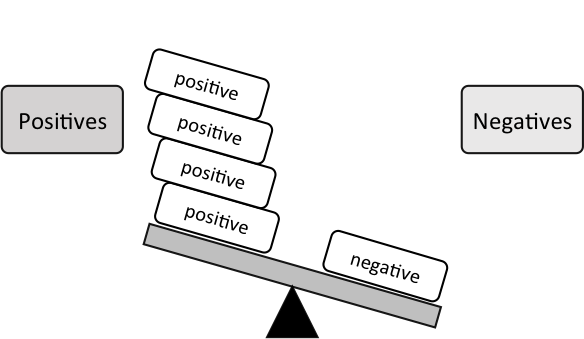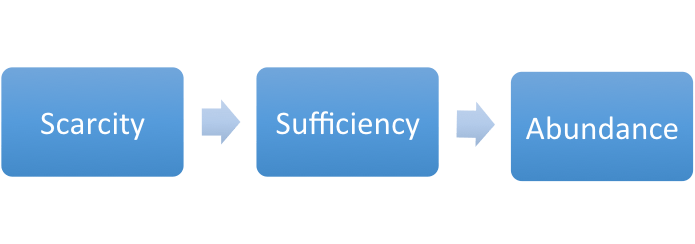Living with gratitude. Living with abundance
I am a big proponent of gratitude.
Acknowledging that I am in favor of gratitude seems silly. Who isn’t in favor of gratitude? In case you were wondering, I also like fresh air, holding sleeping babies in my arms, and freshly-made pie. Of course I am a proponent of gratitude! Gratitude is the basis of every spiritual practice. I have written, made videos, and talked about gratitude for years.
Science can demonstrate positive correlations between gratitude and academic performance. And there are studies that show a link between gratitude and higher levels of immunity. Here is the problem: it seems human beings aren’t wired for gratitude. Science can also demonstrate that our brains aren’t adept at gratitude. Our brains seem hardwired to hold onto the negative more than the positive. Scientists posit that this trait might have come from hunter-gatherer days – if a berry made you sick, you had better have paid close attention to which berry it was. Natural selection and evolutionary biology argue that holding onto the negative was a positive characteristic in the gene pool. Our ancestors who were grateful and positive ended their line of the family tree dying from poisonous berries; our more neurotic ancestors gave birth to us.  Maybe we hold onto criticisms easier than compliments for other reasons? No one really knows why, but it’s true. We are wired to hold negatives more than positives. Consider the following: on your last formal evaluation, which parts stand out? The negatives or positives? Or think about your last trip or meal: are you more prone to tell a story of a snafu or a success? Psychologists say it takes three positive emotions to balance out a single negative one. I have always tried in my classrooms and in my home life to give four compliments (or neutral comments) for every correction. This is not an easy task to start or maintain. The simple statements to “put your name at the top of the paper” or “use your napkin and not your sleeve” need to be balanced out with four positives (or at least neutral comments). But the difficulty associated with this task does not free us from striving to accomplish it. Those familiar with the wisdom in Pirkei Avot know this: “It is not incumbent upon you to complete the task. And neither are you free to desist from it.”
Maybe we hold onto criticisms easier than compliments for other reasons? No one really knows why, but it’s true. We are wired to hold negatives more than positives. Consider the following: on your last formal evaluation, which parts stand out? The negatives or positives? Or think about your last trip or meal: are you more prone to tell a story of a snafu or a success? Psychologists say it takes three positive emotions to balance out a single negative one. I have always tried in my classrooms and in my home life to give four compliments (or neutral comments) for every correction. This is not an easy task to start or maintain. The simple statements to “put your name at the top of the paper” or “use your napkin and not your sleeve” need to be balanced out with four positives (or at least neutral comments). But the difficulty associated with this task does not free us from striving to accomplish it. Those familiar with the wisdom in Pirkei Avot know this: “It is not incumbent upon you to complete the task. And neither are you free to desist from it.”
More gratitude
I strive in my life to notice as many positives as possible as often as I can because I know that the negatives certainly find me. It’s a full-on, daily, hourly, practiced, and perfected treasure hunt. I’m always collecting positives and trying to limit the negatives I put out because the score is the quality of my life, and I am obligated to do everything in my power to win. (I have found that having a journal at night in which I record the best part of the day forces me to keep track of positive moments – and this way they don’t get away.)
 Here is a trick that helped me get into the habit of adding gratitude to my day.
Here is a trick that helped me get into the habit of adding gratitude to my day.
This is akin to The 21-Day No Complaint Challenge, which I’ve talked about previously. This one is called the Thankfulness Challenge, and it was authored by Melody Beattie. Here’s how I did it: For 25 days straight, when I awoke, I wrote out everything for which I was thankful and sent the list to a trusted friend. Seems easy enough. Not very challenging, right? But here’s the catch: I also had to write the things for which I wasn’t thankful, but I had to write as though I was thankful for them. For example, the night before my son’s ninth birthday, he had an anxiety attack. Of course he did. He was about to take an airplane trip by himself to Los Angeles. I was up with him from 1 until 3:30 or 1:30 until 3; I don’t remember. It was just him and me – and his brain going 100 miles per minute. I comforted him as best I could and just laid in the bed with him, listening to his mania. In the morning, when I went to write in my little gratitude journal, I wanted to say “I am not thankful that I was up with my son.” But instead I wrote, as the instructions required, in the positive: “I am thankful that I was up with my son for so long.” The words I wrote were not able to express tone. Of course I wrote them with sarcasm, but when I looked at my words, I read, without even a hint of the sarcasm, “I am thankful that I was up with my son for so many hours in the middle of the night.” And that changed things. There had been magic. I was no longer upset that I was tired. I was actually grateful for our time together and that Emmett had wanted to spend time with me, of all people! All I had done differently was to write that I was thankful for it.
I urge you to try this.
(I will tell you that one day in the 25 days I found an exception. When a dear loved one was horribly wronged at her place of work, I could not write my gratitude for it. I don’t think there is a silver lining to everything.) I can tell you that after a month of the practice, of writing out everything for which I am thankful – even the things I was not really, initially thankful for – my brain was better wired. I had more gratitude in my life.
More than gratitude.
You get the idea of gratitude. I know you do. Gratitude turns what we have into enough. But I want you to see that enough is even more than enough. There are three steps here.
- Scarcity is the mindset that there isn’t enough.
- Enoughness is feeling sufficient, content.
- Abundance is feeling enthusiasm.
 If we wake up in the morning and exclaim (either internally or aloud), “I did not get enough sleep,” it is a sign we are living in a scarcity mentality. Doing gratitude practices can help us to get from this place of scarcity to a place of sufficiency – that we have enough and we are content with what we have.
If we wake up in the morning and exclaim (either internally or aloud), “I did not get enough sleep,” it is a sign we are living in a scarcity mentality. Doing gratitude practices can help us to get from this place of scarcity to a place of sufficiency – that we have enough and we are content with what we have.
Now, I want you to imagine that you wake up in the morning and exclaim (either internally or aloud), “I got enough sleep and I feel great about it.” There exists a mentality that is more than scarcity and more than enoughness. There is a place – a holy place – that we all have sensed from time to time in which we can feel that there is more than enough in the world – a place of abundance.
I’m not talking about HAVING more of anything in the world – not a larger checkbook and not a bigger house. I’m talking about having more of everything that matters. Feeling blessed. Knowing we are blessed. Feeling abundance. Counting our blessings. I have met some people who seem to naturally live in this place of radical abundance. People who live in abundance say, “I am blessed and wonderful with the sleep I got.”
My friend Bill seems able, no matter the circumstances, to feel abundant and blessed. I strive to continue my life’s trajectory to be more and more in abundance.
These people who live lives of abundance have given me a sense that this mindset is possible. I’ve had the most healthy type of jealousy – in which I have said, like St. Augustine said, Si ille o iste, cur non ego – If he or she can do that, why can’t I? I’ve made that journey. Not perfectly. But I’ve moved my internal state from scarcity to sufficiency and into abundance. It took time. But I’ve done it. I set out the goal to live a life of abundance, and I’ve done it. (It took me about 18 months, and it was not a perfectly smooth trajectory, but I’ve done it.) You can too. You know you can. You know you can train your brain to accentuate more of the positive. You can vanquish the powerful thinking part of your mind that enjoys griping and complaining.
I don’t have any magic that changed my perspective. It has just taken time and attention. And, you can do it too. It starts with a desire to get it. And, if you have a desire to get this feeling of abundance – there is no stopping you. If you want it, nothing can keep you from being satisfied and delighted with the life you are living. You need the desire, plus patience and practice. If you want it, you can have it. It’s an internal switch, after all. You want me to let me know when I will be running a small group about gaining abundance in your life, email me, I’m taking names. #wisdom_biscuit: When you count it right, you have even more than enough.




